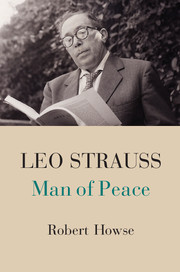Book contents
- Frontmatter
- Dedication
- Contents
- Preface and Acknowledgments
- 1 Introduction
- 2 Warrior Morality and the Fate of Civilization
- 3 Legitimacy and Legality, Thinking and Ruling in the Closed Society and the World State
- 4 Strauss’s Machiavelli
- 5 Thucydides versus Machiavelli
- 6 Justice and Progress
- 7 Conclusion
- Abbreviations
- Index
- References
7 - Conclusion
Published online by Cambridge University Press: 05 September 2014
- Frontmatter
- Dedication
- Contents
- Preface and Acknowledgments
- 1 Introduction
- 2 Warrior Morality and the Fate of Civilization
- 3 Legitimacy and Legality, Thinking and Ruling in the Closed Society and the World State
- 4 Strauss’s Machiavelli
- 5 Thucydides versus Machiavelli
- 6 Justice and Progress
- 7 Conclusion
- Abbreviations
- Index
- References
Summary
Leo Strauss famously wrote that, while philosophy must beware of wishing to be edifying (as Hegel said), it is intrinsically edifying (TOM, p. 299). What can we, as scholars and as citizens, learn from the dramatic encounter between philosophy and political violence in Strauss’s own thought, and the reactions it has engendered?
We might begin by comparing Strauss’s case with that of Heidegger. In her essay “Martin Heidegger at Eighty,” Hannah Arendt writes, with Heidegger’s Nazism in mind:
We who wish to honor the thinkers, even if our own residence lies in the midst of the world, can hardly help finding it striking and perhaps exasperating that Plato and Heidegger, when they entered into human affairs, turned to tyrants and Führers. This should be imputed not just to the circumstances of the times and even less to preformed character but rather to what the French call a deformation professionelle [a weakness or vice that goes along with the profession]. For the attraction to the tyrannical can be demonstrated theoretically in many of the great thinkers
(Kant is the great exception).Arendt tells us that “we” mere mortals might be exasperated about the deformation professionelle, but, for true thinkers, Heidegger’s legacy is “something perfect.”
Information
- Type
- Chapter
- Information
- Leo StraussMan of Peace, pp. 173 - 182Publisher: Cambridge University PressPrint publication year: 2014
